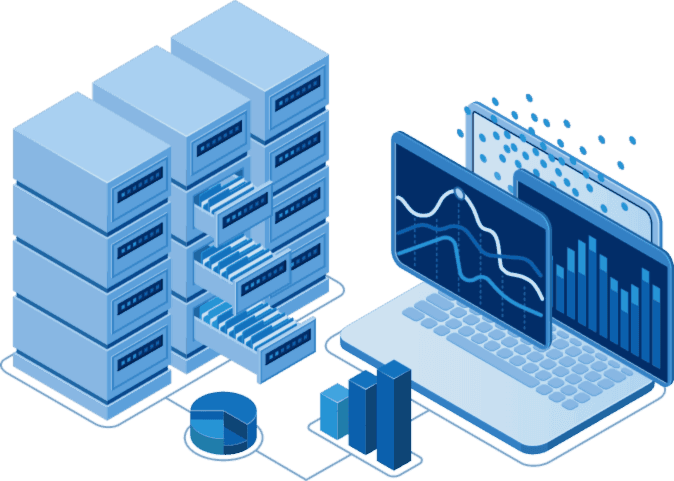How AI Is Transforming the Future of Business Intelligence and Analytics

LIKE.TG 成立于2020年,总部位于马来西亚,是首家汇集全球互联网产品,提供一站式软件产品解决方案的综合性品牌。唯一官方网站:www.like.tg
AI is rapidly emerging as a key player in business intelligence (BI) and analytics in today’s data-driven business landscape. With advanced capabilities in data collection, analysis, and decision-making, AI has the potential to revolutionize how businesses approach data-driven strategies.
Recent studies have shown that AI can improve analytics performance by 69%. As AI technology continues to evolve and mature, its integration into business intelligence and analytics unlocks new opportunities for growth and innovation.
Let’s take a closer look at how AI is transforming the future of business intelligence and analytics and what it means for businesses looking to stay ahead of the curve.
Top 6 AI-Driven Strategies for Business Intelligence and Analytics
Automated Data Collection
Businesses today face the challenge of collecting and analyzing massive amounts of data to power their data-driven initiatives. Unfortunately, up to 90% of business-critical information is buried in unstructured sources, such as PDFs, emails, TXT, and other file formats.
To address this challenge, AI-powered solutions have emerged with advanced capabilities such as natural language processing (NLP), optical character recognition (OCR), and computer vision. These tools can effectively identify and extract relevant data from unstructured sources.
AI algorithms can recognize patterns and relationships within the data, enabling them to extract data accurately. This, in turn, enables businesses to automate the time-consuming task of manual data entry and processing, unlocking data for business intelligence and analytics initiatives.
Moreover, AI-powered automated data collection also improves data quality by minimizing the potential for human errors that commonly occur during manual data entry. By helping businesses automate data collection, AI gives access to restricted data, enabling them to extract crucial insights.
Intelligent DataPrep
High-quality data is essential for getting the most out of a BI solution. However, a Forbes study revealed up to 84% of data can be unreliable. Luckily, AI-enabled data prep can improve data quality in several ways.
AI algorithms can detect and correct errors in data in real-time, minimizing inaccuracies and ensuring access to accurate and reliable data. While at times underlying quality issues can persist, many AI-powered solutions enable users to profile data, identifying hidden patterns and anomalies automatically.
For instance, AI-powered data preparation can validate data against predefined rules, automatically highlighting underlying errors. By identifying quality issues early, businesses can address them proactively and correct them before they generate misleading insights.
Moreover, intelligent data prep systems use “feedback loop learning” to continuously analyze their performance and adjust algorithms based on identified errors. This improves accuracy, especially for complex or unstructured data. Through this learning process, these tools become more accurate at addressing common data preparation issues automatically.
Likewise, data scientists can leverage AI-enabled fuzzy lookup to maintain data consistency by identifying and matching similar but not exact values in a data set. For instance, it can identify “Jonh Doe” and “John Doe” as the same customer despite different spellings if other attributes match. These lookups are essential when dealing with data containing misspellings, typos, or other inconsistencies.
Fuzzy lookup can also identify and merge duplicate records, helping clean up data sets and eliminate redundancies. Businesses can make data-driven decisions with greater confidence by improving the overall quality and accuracy of the data.
Lastly, intelligent data prep can revolutionize cloud-based BI by automating data processing and analysis. With AI-powered features, data prep and cloud BI tools can automate data cleansing, integration, and transformation, saving time and improving data quality.
As a result, organizations access insights faster, enjoy enhanced data governance, and data quality management. Intelligent data prep empowers organizations to make reliable, accurate and informed decisions faster, unlocking the full potential of data in a dynamic business landscape.
AI-Generated Synthetic Data
Synthetic data is artificially generated data statistically similar to real-world information. With businesses increasingly utilizing business intelligence, leveraging synthetic data can help overcome data access challenges and privacy concerns.
For instance, in healthcare, data experts can use synthetic data to train machine learning (ML) models. By supplanting limited patient data, synthetic data can help ML models detect early signs of diseases.
Similarly, financial experts can leverage synthetic data to train models to predict stock prices or detect fraudulent activity if they lack historical data or it is in short supply.
Also, synthetic data sets can mimic different scenarios, which is particularly useful in the transportation industry. Here, supply chain experts can leverage synthetic data to simulate traffic conditions and test the effectiveness of various route optimization algorithms.
By leveraging synthetic data, businesses can gain valuable insights and make better decisions without relying solely on real-world data. With BI tools evolving, synthetic data can catalyze the early adoption of AI-driven technologies.
Model Compression
Model compression techniques have emerged as critical enablers in the era of data-driven decision-making, providing faster, more efficient, and more accurate insights. These techniques help reduce the size of AI models while maintaining their accuracy.
One of the most significant advantages of model compression is the speed it brings to generating insights. By reducing the time, it takes to generate insights, businesses can respond more quickly to changing market conditions and gain a competitive advantage.
Another significant advantage of model compression is its ability to reduce the memory footprint of models. This is particularly useful in environments with limited technological resources. Compressed models bandwidth requirements of business intelligence tools, making them more efficient to store and process information. Thus, improving the performance of AI models.
Lastly, model compression can enhance the accuracy of models by reducing overfitting. In other words, model compression simplifies AI algorithms, making them better at making predictions against new data. As a result, models become more robust against noise and outliers, leading to more accurate predictions and better decision-making outcomes for businesses.
AI-Powered Predictive Analytics
AI-powered predictive analytics is transforming how businesses operate by providing unparalleled insights and predictions. These advanced algorithms are designed to easily analyze larger and more complex data, such as big data, giving companies real-time insights that were once impossible to achieve. They can detect hidden patterns within big data and live data sources such as data warehouses.
AI analytics has enabled shipping companies to optimize their routes and delivery schedules. For instance, by analyzing data on traffic patterns, weather conditions, and delivery schedules in real-time, the system can generate the most efficient route for each shipment. This can reduce transportation costs, improve delivery times, and ultimately increase customer satisfaction.
Similarly, financial services can use AI-powered analytics to identify and prevent fraud through real-time transactional data analysis. Data warehouses provide the necessary historical data foundation, supporting the analysis and training of AI models. Using AI-powered predictive analytics, financial institutions can enhance fraud detection capabilities, protect customers and assets, and securely manage operations.
Likewise, AI and machine learning can also help institutions divide customers into segments and improve customer retention by predicting which customers will likely stay or leave. As a result, organizations can generate personalized retention strategies much more efficiently. As AI technology continues to evolve, AI-powered predictive analytics will likely become an integral part of business intelligence across industries.
Organizations are increasingly turning to AI, whether in healthcare or retail or manufacturing, to help them better understand data and make more informed business decisions. With the help of AI-powered predictive analytics, businesses can gain a competitive edge, increase efficiency, and ultimately drive growth.
Adaptive AI
Adaptive AI systems are revolutionizing the way businesses approach business intelligence and analytics initiatives. These systems provide powerful AI features that allow organizations to deploy predictive and forecasting models that learn from past experiences and adapt to changing real-world scenarios.
By combining business intelligence with adaptive AI, businesses can gain personalized insights that can be used to tailor marketing, sales, and customer service strategies to individual customers.
Adaptive AI systems provide a foundation for building less rigid AI engineering pipelines or building AI models that can self-adapt in production, resulting in more agile and flexible systems.
This flexibility allows businesses to respond to changing environments, limited training data, and personalize generalized results, enabling better decision-making and more efficient data processing.
Many businesses across various industries are already taking advantage of adaptive AI systems to drive value. For example, Dow, a US chemical and materials manufacturer, has deployed adaptive AI systems to enhance their enterprise analytics. This deployment has resulted in a 320% increase in value generated by the analytics platform.
Adaptive AI systems are transforming the way businesses approach data processing, decision-making, and customer service. By leveraging the power of these systems, businesses can gain a competitive advantage by improving personalization, increasing efficiency, and driving growth.
Adopting AI for Advanced Business Intelligence and Analytics
Artificial Intelligence offers a wide range of benefits that can significantly enhance the capabilities of BI and analytics. From more accurate predictions and real-time insights to personalized recommendations, AI can help businesses better understand their customers, improve operations, and ultimately drive growth and profitability.
That said, adopting AI for business intelligence and analytics can be challenging without the right tools in place. Without proper data management, companies struggle to access and use data required for AI implementation, which can lead to poor results or even failure.
Leveraging a comprehensive data management platform provides the necessary foundation for successful AI initiatives. It simplifies the implementation of AI models, reduces complexity, and allows organizations to derive meaningful insights from their data while maintaining data quality, security, and compliance standards.
Do you want to see how LIKE.TG can help your organization achieve its AI goals?
Contact us today to learn more about our data management platform and how it can simplify the deployment and scaling of AI models, reduce the time and cost of AI implementation, and, ultimately, give you a competitive advantage.
Let LIKE.TG be your partner in driving operational efficiency and enhancing customer experience through AI-powered insights. Sign up for a custom demo!

现在关注【LIKE.TG出海指南频道】、【LIKE.TG生态链-全球资源互联社区】,即可免费领取【WhatsApp、LINE、Telegram、Twitter、ZALO云控】等获客工具试用、【住宅IP、号段筛选】等免费资源,机会难得,快来解锁更多资源,助力您的业务飞速成长!点击【联系客服】
本文由LIKE.TG编辑部转载自互联网并编辑,如有侵权影响,请联系官方客服,将为您妥善处理。
This article is republished from public internet and edited by the LIKE.TG editorial department. If there is any infringement, please contact our official customer service for proper handling.
















